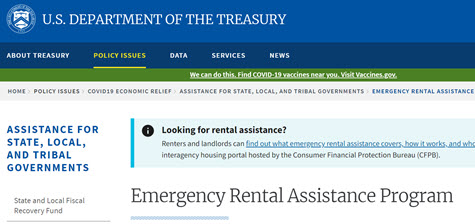The U.S. Supreme Court struck the Biden Administration’s nationwide ban on residential tenant evictions yesterday, ruling that only Congress has the authority to enact such a moratorium through legislation. (New York Times, Aug. 27; Wall St. Journal, Aug. 27)
The Legal Challenge
The high court’s conservatives issued a majority, 6-3 opinion striking the latest iteration of the eviction ban issued by the Centers for Disease Control (CDC) on Aug. 3. (Roundtable Weekly, Aug. 20). “If a federally imposed eviction moratorium is to continue, Congress must specifically authorize it,” the Justices decided.
- The gist of the ruling is that the CDC’s public health role could not be stretched so far to encompass the federal ban. “[T]he CDC has imposed a nationwide moratorium on evictions in reliance on a decades-old statute that authorizes it to implement measures like fumigation and pest extermination,” the majority wrote. “It strains credulity to believe that this statute grants the CDC the sweeping authority that it asserts.”
- The majority recognized the financial burden on landlords deprived of rent payments with no guarantee of recovery. “Despite the CDC’s determination that landlords should bear a significant financial cost of the pandemic, many landlords have modest means” the majority wrote. “And preventing them from evicting tenants who breach their leases intrudes on one of the most fundamental elements of property ownership—the right to exclude.”
- Three justices in the Court’s liberal minority would have kept the moratorium in place due to the surge of the Delta variant.
Focus on Disbursing Rental Assistance

- A coalition of national real estate organizations – led by the National Apartment Association and the National Multifamily Housing Council, and including The Real Estate Roundtable – has consistently opposed the CDC’s eviction ban.
- The groups have called upon Congress to focus on disbursing billions in unspent sums of federal rental assistance appropriated in prior COVID-19 relief bills – instead of destabilizing rental markets with a nationwide eviction ban. (Roundtable Weekly, July 30).
- The latest figures released by the Treasury Department this week on the status of rent relief disbursements remain disheartening. While more funds are reaching tenants and landlords, only $5.1 billion out of a total $46.5 billion in Emergency Rental Assistance has been distributed by states and localities through the end of July. (AP, Aug. 25)
- Roundtable President and CEO Jeffrey DeBoer commented, “Federal, state, and local policymakers must act with urgency to ensure that tenants and housing providers in distress due to the pandemic receive the aid the Congress appropriated for them – and help bring stability to our housing markets.”
- States have had varying levels of success in getting federal rent assistance out the door. “Texas and Virginia have distributed the largest percentages of their allocated funding at around 34% and 41% respectively, while New York State hasn’t even doled out 1% of its federal rental assistance.” (U.S. News, Aug. 25).
- The Treasury Department has a website to help tenants and landlords find rental assistance programs in their local areas. The National Multifamily Housing Council (NMHC) also has an online hub that provides resources for renters and housing providers to access COVID-19 emergency relief.
While the Supreme Court’s ruling is the end point for litigation challenging the Biden Administration’s actions, progressives in Congress could attempt to re-impose the eviction ban via legislative enactment in the coming weeks.




